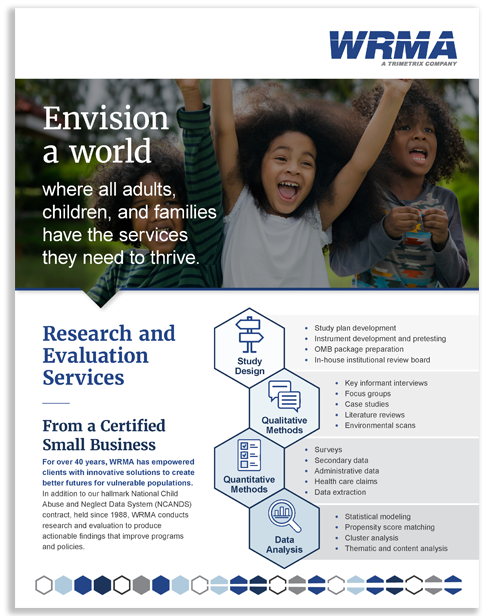From a Certified Small Business
For over 40 years, WRMA has empowered clients with innovative solutions to create better futures for vulnerable populations. In addition to our hallmark National Child Abuse and Neglect Data System (NCANDS) contract, held since 1988, WRMA conducts research and evaluation to produce actionable findings that improve programs and policies.
Strengths
- Study plan development
- Instrument development and pretesting
- OMB package preparation
- In-house institutional review board
- Key informant interviews
- Focus groups
- Case studies
- Literature reviews
- Environmental scans
- Surveys
- Secondary data
- Administrative data
- Health care claims
- Data extraction
- Statistical modeling
- Propensity score matching
- Cluster analysis
- Thematic and content analysis
Research and Evaluation Snapshots
Child Welfare
WRMA supports ACF in fostering the health and well-being of children, youth, families, individuals, and communities. As part of the ACF NCANDS technical team, WRMA researchers have published several studies using NCANDS administrative data.
- WRMA studied the impact of COVID-19 on child welfare systems and found the number of reports to Child Protective Services (CPS) declined significantly, largely due to a reduction in referrals from education professionals. At the same time, the percent of reports substantiated increased.
- WRMA also examined the associations between current adolescent mothers’ maltreatment perpetrator characteristics and their prior experience with CPS as alleged victims. This research extends the evidence base on intergenerational transmission of maltreatment.
Older Adult Health and Wellbeing
WRMA bolsters ACL’s work to maximize the independence, wellbeing, and health of older adults, people with disabilities across the life span, and their families and caregivers.
WRMA conducted a comprehensive evaluation of state adult protective services (APS) policies and practices, including a qualitative review of state APS policies and a national web-based survey of key program practices. Quantitative analysis examined associations between program policy and practice with system-level outcomes. Researchers conducted an exploratory cluster analysis to detect underlying patterns in system-level outcomes across groups of states with similar patterns of APS implementation.
WRMA researchers are helping ACL leverage “big data” to predict adult maltreatment while ensuring systemic biases are not proliferated in the application of algorithmic solutions. We conducted an environmental scan and literature review to inform the development of predictive algorithms, including prior use of predictive analytics in protective services and risk and protective factors associated with adult maltreatment. Our team has modeled county-level growth in abuse, neglect, and exploitation reporting to APS, and is applying machine learning algorithms to predict individual likelihood of maltreatment substantiation.
Health Systems
WRMA continues to assist HRSA in improving health and achieving health equity through access to quality health care services.
WRMA has conducted several studies for the HRSA Ryan White HIV/AIDS Program (RWHAP). To inform improvements to RWHAP Part D, WRMA conducted listening sessions, a technical expert panel, and secondary analysis of HIV surveillance data, client-level data, and funding allocations data.
WRMA also conducted a study of primary care services offered by RWHAP clinics, including the types of services provided, types and reasons for referrals, and service delivery management practices. This in-depth study included clinic director and clinician surveys, medical director interviews, and medical chart reviews.
Food and Nutrition Security
WRMA supports USDA in ensuring its food and nutrition assistance programs increase food security and reduce hunger among children and individuals with low-income.
WRMA is conducting a study to enable USDA’s Food and Nutrition Service (FNS)) to meet federal requirements by estimating improper payments to family daycare homes in the Child and Adult Care Food Program. We are working with State agencies to acquire and extract administrative claims and monitoring review data to test a methodology for calculating national estimates of improper payments.
WRMA completed a study for FNS to identify policies, practices, and processes associated with Supplemental Nutrition Assistance Program (SNAP) application processing timeliness – a key measure of participant access. We conducted a comprehensive document review, in-depth case studies, and a web-based survey of 51 SNAP State agencies with phone follow-up for clarification and non-response.
Featured Expert
Dr. Gila Shusterman
Dr. Gila Shusterman is a social scientist with 30 years of experience in evaluation, applied research, and project management in the areas of child welfare, human services, and education.
Her background includes research and evaluation design and implementation in small nonprofit organizations as well as large national initiatives. Dr. Shusterman’s work has involved management, analysis, and visualization of large administrative datasets, including NCANDS and the National Adult Maltreatment Reporting System (NAMRS), to inform policymakers and human services administrators.








